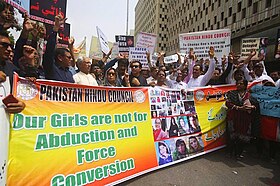The United Nations (UN) Human rights experts sounded alarm at the lack of protection for women and girls belonging to minority communities in Pakistan, saying that they remained vulnerable to forced marriages and conversions, Pakistan national media reported.
“Christian and Hindu girls remain particularly vulnerable to forced religious conversion, abduction, trafficking, child, early and forced marriage, domestic servitude, and sexual violence,” the experts said in a statement issued in Geneva on April 11, 2024.
The chair of the working group on discrimination against women and girls, Dorothy Estrada Tanck, along with members Claudia Flores, Ivana Krstic, Haina Lu, and Laura Nyirinkindi, united with the experts in expressing grave concern over the prevailing situation, according to Pakistan national media.
This collective action comes under the auspices of the Special Procedures of the UN Human Rights Council, encompassing independent fact-finding and monitoring mechanisms addressing specific country situations or thematic issues globally, as reported by Pakistan national media.
In their joint statement released on April 11, 2024, the UN experts underscored the intolerable nature of human rights violations faced by young women and girls from religious minority backgrounds.
“The exposure of young women and girls belonging to religious minority communities to such heinous human rights violations and the impunity of such crimes can no longer be tolerated or justified,” they said.
They particularly condemned the disturbing trend of forced marriages and religious conversions, often “validated by the courts, often invoking religious law to justify keeping victims with their abductors rather than allowing them to return them to their parents”.
The experts lamented the prevailing culture of impunity, where perpetrators often evade accountability, with authorities dismissing crimes under the guise of ‘love marriages’. “Perpetrators often escape accountability, with police dismissing crimes under the guise of ‘love marriages’,” they said, as reported by Pakistan national media.
They emphasised that child, early, and forced marriages could not be justified on religious or cultural grounds, asserting that consent was irrelevant when the victim was below 18, in accordance with international law. In Pakistan, the legal marriage age stands at 16 for girls and 18 for boys. However, the experts stressed that a woman’s right to freely choose her spouse and enter into marriage was fundamental to her dignity and equality, necessitating robust legal protection.
“A woman’s right to choose a spouse and freely enter into marriage is central to her life, dignity and equality as a human being and must be protected and upheld by law,” the experts said. They advocated for measures to invalidate or dissolve marriages contracted under duress, ensuring access to justice, remedy, and protection for victims.
“Notwithstanding the right of children to freedom of thought, conscience and religion in accordance with Article 14 of the Convention on the Rights of the Child, change of religion or belief in all circumstances must be free, without coercion and undue inducements,” the UN experts said.
“The Pakistani authorities must enact and rigorously enforce laws to ensure that marriages are contracted only with the free and full consent of the intended spouses, and that the minimum age for marriage is raised to 18, including for girls,” the experts stated, adding that all “women and girls must be treated without discrimination, including those belonging to the Christian and Hindu communities”.
Highlighting the urgency of bringing perpetrators to justice and upholding international human rights obligations, the experts urged Pakistan to rigorously enforce legal protections against child marriage, abduction, and trafficking of minority, Pakistan national media reported.




















Comments